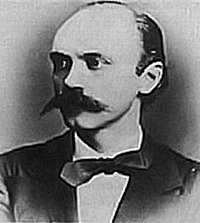Biography
Calixa was the son of Augustin Lavallée and Charlotte-Caroline Valentine.
Calixa’s father was originally a wood cutter and blacksmith, but eventually began repairing musical instruments and teaching music in his local community. After moving to St. Hyacinthe, his father worked for organ builder Joseph Casavant.
Calixa was playing the organ by age 11, and at age 13 gave a piano recital in the Théâtre Royal in Montréal.
In 1857, Lavallée moved to America and lived in Rhode Island. He toured the world as a musician and accompanist to Spanish violinist Olivera, including visits to Brazil and Mexico.
After returning to America, he enlisted in the 4th Rhode Island Volunteers as a cornet player during the American civil war. He reached the rank of lieutenant, and was wounded in battle.
During and after the war, he traveled between Canada and the United States, building his career in music. In the 1860s, Lavallée lived briefly in Montréal, Chicago, Philadelphia, and New York City, but spent most of his time traveling with minstrel shows.
He was also a pianist, organist and music teacher. In 1887, he became president of the Music Teachers’ National Association.
During the later years of his life, he was choir master at the Cathedral of the Holy Cross in Boston, Massachusetts.
Works
Lavallée wrote operettas, a symphony, and various occasional pieces and songs. The Congrès National des Canadiens-Français commissioned Lavallée to compose O Canada for St. Jean-Baptiste Day in 1880.
